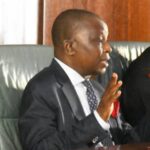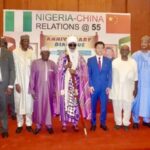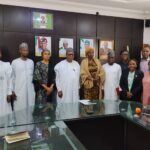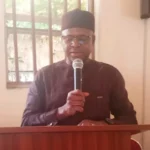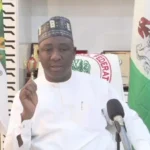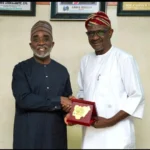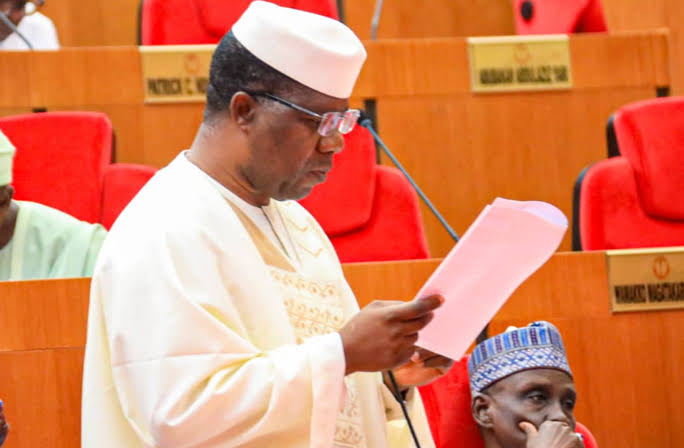By Naomi Sharang, News Agency of Nigeria (NAN)
Inaugurated on June 13, 2023, the 10th Nigerian Senate, under the leadership of Senate President, Godswill Akpabio, has dubbed itself the “uncommon Senate”.
This designation reflects an ambition to stand out in productivity and impact, with emphasis on “people-centred” legislation.
In his inaugural speech, Akpabio had assured his colleagues of cooperation in all matters.
He said that their joint efforts would bolster efficiency in the red chamber.
“It is time now to go forward with the task set before us as a collective body – the promulgation of laws and enactments for the well-being and security of the country,’’ he said.
Two years after, observers say the 10th Senate has made significant legislative and oversight moves, aiming to shape Nigeria’s policy and economic landscape.
They say the Senate Leader, Opeyemi Bamidele, who represents Ekiti Central Senatorial District, stands out.
Worthy of note, Bamidele played key roles in the last two years in the formulation and prioritisation of several significant legislative initiatives including the introduction and passage of the Tax Reform Bills 2024.
The Tax Reform Bills include the Joint Revenue Board (Establishment) Bill, 2025; the Nigeria Revenue Service (Establishment) Bill, 2025; the Nigeria Tax Administration Bill; the Nigeria Tax Bill.
The executive bills, sponsored by Bamidele, are poised to redefine Nigeria’s fiscal landscape and offer the prospect of enhanced revenue without overburdening taxpayers.
“Since the birth of the 10th Senate about two years ago, I have been discharging the duties of my office with modest records of accomplishment.
“One of such accomplishments is the timely passage of key legislations, particularly in the areas of fiscal reform and national security.
“By engaging my colleagues across all political divides, we have successfully passed laws aimed at creating an environment for economic competitiveness and positioning Nigeria for a 1 trillion dollars economy by 2030.
“I am proud to say that many of these legislative initiatives are already making a difference in the daily lives of our citizens.’’
Bamidele said that efforts were exemplified in the amendment of the National Social Investment Programme Agency (Establishment) Act, 2024.
The Senator explained that the Act guaranteed the sustainability of the National Social Investment Programme (NSIP) as a valuable tool for poverty alleviation in Nigeria.
“The frameworks are designed to foster environmental sustainability; encourage greater access to qualitative health care; discourage social dislocation; eliminate terrorism and insecurity and reduce the gap between the haves and the have-nots,’’ he said.
The Senate also passed the Investments and Securities (Repeal and Re-enactment) Bill, 2024.
More so, the Senate amended the Nigeria Data Protection Act (Amendment) Act, 2023 to mandate social media platforms and bloggers to establish physical offices in Nigeria.
The amendment further aims at promoting accountability and transparency within the digital media space.
Another key bill of the 10th Senate is the Student Loans (Access to Higher Education) (Repeal and Re-enactment) Bill, 2024.
The bill established the Nigerian Education Loan Fund (NELFUND), designed to provide financial aid to students in tertiary institutions.
Other achievements of the 10th Senate was the passing into law, the Minimum Wage Bill which President Bola Tinubu approved a minimum wage increase from N30,000 to N70,000, a response to prolonged agitation from labour unions in the country.
The legislation also mandates a review of wages every three years, ensuring that pay keeps pace with inflation.
There is also the Judicial Office Holders Salaries and Allowances Bill that was signed into law, raising their earnings by 300 per cent.
Similarly, are the bills on regional development commissions which were all signed into law by the President.
These commissions are the South-West Development Commission (SWDC), the South-South Development Commission (SSDC), and the North-West Development Commission (NWDC).
Others are the South-East Development Commission (SEDC), the North-East Development Commission (NEDC) and the North-Central Development Commission (NCDC).
The Chairman Senate Committee on Media and Public Affairs, Sen. Yemi Adaramodu, scored the 10th Senate high.
“We have done very well and we have delivered on our mandate as representatives of the people.
“You know that the legislature is for three-pronged functions; law making, oversight functions and then advocacy for our constituents.
“So, when we talk about law making, at least in the past two years, we have sorted out nothing less than 700 bills.
“Some are in the third reading; some are in the second reading; some have just come through the first reading.
“And some have already been passed to the Presidency for assent and some have been assented to and they have become laws.”
Adaramodu, representing Ekiti South, said that the 10th Senate had raised so many motions adding that many of the motions and resolutions therefrom, had been sent to the executive.
“Some have been executed; some are still under processes of maybe inviting those who are concerned.
“We have dealt with so many public petitions and we have done a lot, lawmaking wise.
“And then when we talk about oversight function, we have done a lot, especially as it is related to security matters.
“We have invited the security chiefs almost eight times in order to interrogate them, to ask questions, to give them suggestions and then to ensure that they are never left alone.
“Maybe lack of facilities, arms and ammunition and then their welfare, we have done all those things.
“We have done a lot; we have assisted the Executive to ensure that minimum wage was raised by more than 100 per cent to Nigerian workers.
“We have made sure that the judiciary has never been left alone in our own advocacy too whereby we have raised the judicial officers’ emoluments by almost 300 per cent.’’
In terms of infrastructure, Adaramodu said the upper chamber had done a lot in that manner.
“We have been able to appropriate enough and to make sure that we supervise the Executive in making sure that roads construction and rehabilitation are given adequate attention.’’
He listed the top priority road projects to include the Badagry-Sokoto Road; roads leading from Kaduna to Kano and the road leading from Abuja to Lokoja.
On the Legislature-Executive relations, the lawmaker said the Senate approved only bills that would have direct impact on citizens.
“We are not going to publish everything that is brought to the National Assembly; so, the ones that cannot scale through in most cases will not and the ones that will scale through will scale through.
“And there is no way the executive will bring any bill which is for the advancement of Nigeria and Nigerians that will be rejected,’’ he said.
On his part, the Chairman, Committee on Senate Services, Sen. Sunday Karimi, said the 10th Senate had lived up to the expectations of the people who voted them into office.
“It has been two years since the 10th Senate was inaugurated; so far, so good, we have at least performed the expectations of our people.
“A lot of bills and motions that impact positively on our people have been passed into law.
“The government brought an increase in salary for workers, a request to us, and we immediately passed it so that workers’ earnings will increase.
“Not just that, the student loan scheme, the NELFUND, which will allow Nigerian students to take loans to finance their education.
“This bill became an act of parliament which enables Nigerian students to easily have access to loans.’’
Nonetheless, some concerned Nigerians have flayed the Senate for pandering to the executive.
Recently, Pastor Tunde Bakare, the Presiding Overseer of the Global Community Citadel Church, said that the National Assembly had become a haven for legislative rascality.
He faulted the red chamber for rubber stamping everything the President sent to it.
However, Karimi, who represents Kogi West Senatorial District, rejected opinions that the 10th Senate was a rubber stamp legislature.
“If you call it a rubber stamp Senate, that is a mistake; it is an error; we are not out to fight this government; we are out to work with this government to impart positively on our people.
“Let me tell you, there are areas we disagree with the executive; we may not do it publicly for you to know.
“Sometimes, we go into closed-door sessions and iron out our disagreements.
“So, if you say that it is a rubber stamp, no; let me tell you something, Tinubu was advised to remove our zonal intervention projects, and he was going to do that.
“I can tell you the leadership of the 10th Assembly disagreed strongly with the president; it was not only restored, the president increased it,’’ he said.
While the Senate applauds its accomplishments so far, political pundits say the National Assembly needs to rise up to its mandate of making laws for the peace, order and good governance as well as representing the interests and wellbeing of the citizenry.(NANFeatures)
***If used, please credit the writer and the News Agency of Nigeria.

